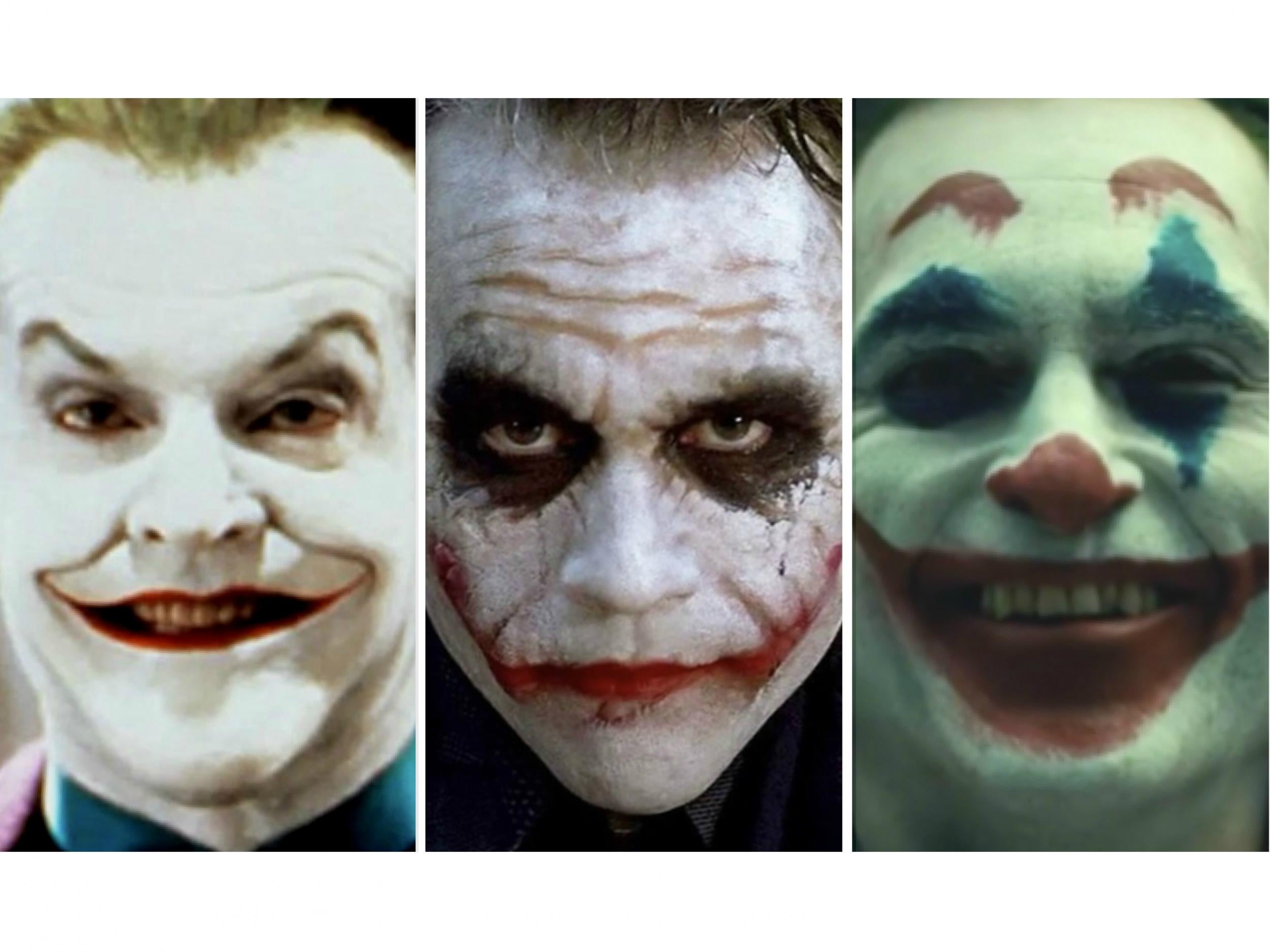How The Joker attracted the best actors of their generations
Joaquin Phoenix is the latest drama actor to say yes to a comic book role, so what is it about the 'Clown Prince of Crime' that keeps the acting greats moving across? By Christopher Hooton

Jack Nicholson. Mark Hamill. Heath Ledger. Jared Leto. Joaquin Phoenix.
The Joker is the exceptional superhero movie character who has lured not only actors of the very highest calibre, but ones who don’t normally go for that sort of role. Though Tilda Swinton, Anthony Hopkins, Idris Elba and Cate Blanchett have all surprised by dipping their toes into the Marvel Cinematic Universe in recent years, it was Phoenix signing up to play The Joker for DC in July that was the most unexpected casting to date.
Here was an actor known for his partnership with auteur Paul Thomas Anderson (The Master, Inherent Vice), and a year-long piece of cinematic performance art (I’m Still Here), joining a comic book extended universe comprising characters with names including Captain Boomerang and Killer Croc.
So what is it about the “Clown Prince of Crime” that proves irresistible to actors who could take pretty much any role in Hollywood they want? What made Ledger want to go to the lengths of locking himself in a hotel room for a month to prepare for the role? What compelled Leto to allegedly post fellow cast members dead pigs and sticky porn mags as part of his preparations? Just what is it that makes periodically reinventing the villain one of the most coveted gigs in modern cinema?

Though he is a criminal mastermind, and a cruel prankster with a warped sense of humour, The Joker has no supernatural powers. It is this very fact – the sense of realism his lack of unearthly abilities evokes – that is often cited as his character’s appeal. But he’s not unique in that regard. Though there are plenty of Batman enemies that run on mysterious supersteroids (as was the case with Bane) and cryogenic chemicals (Mr Freeze), there are just as many non-mutated humans who serve as antagonists, film favourites such as The Penguin, Two-Face and The Riddler.
Perhaps then, the key factor in The Joker’s cinematic allure is not his lack of superpowers but rather his lack of motive.
“Some men aren’t looking for anything logical, like money,” Michael Caine’s Alfred said in one of The Dark Knight’s most infamous lines. “They can’t be bought, bullied, reasoned, or negotiated with. Some men just want to watch the world burn.”
In The Joker: A Serious Study of the Clown Prince of Crime – the first academic book to focus on a comic book supervillain – co-authors Robert Moses Peaslee and Robert G Weiner argue their subject is not so much an anarchist – the most obvious reading of his worldview – but a Marxist. He is the perfect opposing force to Batman – a capitalist through and through. Bruce Wayne is the one per cent, a proto Elon Musk who thinks the world can be saved with technology. He’s a libertarian with little faith in government-funded bodies when it comes to the suppression of evil, and prefers a lone vigilante approach.
Alejandro G Iñárritu, director of Oscar-winning superhero movie satire Birdman, once described superhero films as “very right wing”. “I always see [superheroes] as killing people because they do not believe in what you believe, or they are not being who you want them to be,” the filmmaker told Deadline magazine. As such, Wayne doesn’t always make for a particularly sympathetic character. In his review of Tim Burton’s 1989 film, Batman, critic Roger Ebert found Nicholson’s Joker so compelling he felt “we have to remind ourselves to cheer for [Batman].”
But while The Joker may indeed have Marxist credentials, in terms of being a proponent of unrestrained freedom, having an allegiance to Gotham’s underclass, and possessing a distaste for money – a vast pile of which he famously set on fire in The Dark Knight – he’s not exactly an egalitarian to root for.

Watch Apple TV+ free for 7 day
New subscribers only. £9.99/mo. after free trial. Plan auto-renews until cancelled.
ADVERTISEMENT. If you sign up to this service we will earn commission. This revenue helps to fund journalism across The Independent.

Watch Apple TV+ free for 7 day
New subscribers only. £9.99/mo. after free trial. Plan auto-renews until cancelled.
ADVERTISEMENT. If you sign up to this service we will earn commission. This revenue helps to fund journalism across The Independent.
A more useful way to think of him might be as a Nietzschean “Ubermensch” – or “Superman”, although not to be confused with his DC superhero stablemate – an amoral being who has turned away from the world and created his own one within it.

Consider the list of elements that draw anarchists to philosopher Nietzsche, according to periodical magazine Fifth Estate. “His hatred of the state; his disgust for the mindless social behaviour of ‘herds’; his anti-Christianity; his distrust of the effect of both the market and the state on cultural production; his desire for an ‘overman’ – that is, for a new human who was to be neither master nor slave; his praise of the ecstatic and creative self, with the artist as his prototype, who could say, ‘yes’ to the self-creation of a new world on the basis of nothing.”
Is there a better description of The Joker than a man who says “yes” to the self-creation of a new world on the basis of nothing?
It’s this complete lack of plan, motive or causation that makes him such a compelling villain. For me, the most thrilling moment in The Dark Knight comes when Ledger’s Joker first changes his story on how he “got these scars”. His original explanation of an abusive father taking a knife to his mouth seems such a perfect back story, a classic bit of this-is-why-they’re-so-messed-up Hollywood exposition. But it’s fake, and the Joker has a different story for every person he “confides” in. We realise we’re dealing with a man who probably does have a dark back story, but lives so completely in the moment he has no interest in recounting it. It does beg the question as to whether an origin story – which Phoenix’s upcoming Joker film is set to be – is really the kind of story we want to see.
Pressed as to why he said yes to the project, Phoenix told movie website Collider: “Mostly, it scares the f*****g s**t out of me. It might as well be the thing that scares you the most [that you do next].”
Director Todd Phillips has taken inspiration from Martin Scorsese classic Taxi Driver for Joker, which will centre on Arthur Fleck, a Travis Bickle of sorts, whose failing stand-up comedy career turns him to a life of crime and chaos. Phillips has described it as an “exploration of a man disregarded by society, [that] is not only a gritty character study, but also a broader cautionary tale.” He’s certainly given The Joker an interesting motivation but it remains to be seen whether it can prove more enthralling than the simple lack of one.
And though the Joker’s absent ideology is certainly a big part of his appeal, the more simple matter of his appearance can’t be overlooked. Though obviously based around a joker playing card – with the first sketch of the character dating back to 1940 – it is a clown he has come to resemble, most vividly in the latest photo of Phoenix in costume, which Phillips posted on Instagram this week.
However pervasive and persistent coulrophobia – fear of clowns – may be, the whole green hair, painted face, dishevelled suit get-up shouldn’t still work; it is a clichéd costume if ever there was one. But Ledger, The Dark Knight director Christopher Nolan and his team made it more iconic than even Nicholson and Burton before them, precisely because of its cheesiness. Here was a villain who didn’t dress a certain way because he thought it looked cool or functional or befitting of his stature – like a General Zod from the Superman films, for instance – but because it was absurd. The Joker commits repulsively evil acts from under a chilling veil of irony.

And then there’s that smile. Scarecrow’s burlap sack hood in Batman Begins and Bane’s breathing apparatus in The Dark Knight Rises just felt a bit odd, but who can’t relate to having, at some point in their lives, metaphorically painted a smile over their sullen face?
Batman’s saga might be the only one where it is now the villain who is carrying the hero when it comes to filling cinemas. Christian Bale gave his Bruce Wayne a Patrick Bateman edge in Nolan’s trilogy, and he was one of the more successful actors in the role, but Ledger ate his scene partner for breakfast. Jared Leto’s psychopath punk take on the Joker ultimately proved a letdown, and yet he cornered way more attention than Ben Affleck’s Batman in Suicide Squad.
Heath Ledger can’t be credited enough for this. For all the interesting character traits inherent to The Joker, the unbelievably well-defined concept for the villain the late actor brought changed everything. Before The Dark Knight, fans bemoaned the part going to a handsome young actor known to many for his romcoms, Nicholson himself expressed disappointment he hadn’t been asked to reprise the role. But Ledger’s performance silenced everyone and gave the character staying power.
Before Phoenix, Leonardo DiCaprio was also considered to play the “Jester of Genocide” in the upcoming origin film, and it’s hard to imagine two actors more tantalising for the role. But while Ledger managed to top Nicholson against all odds, DiCaprio, Phoenix or whoever else might subsequently tackle the part, will – with Ledger in the rearview mirror – have one of the biggest challenges in blockbuster acting history.
Join our commenting forum
Join thought-provoking conversations, follow other Independent readers and see their replies
Comments
Bookmark popover
Removed from bookmarks